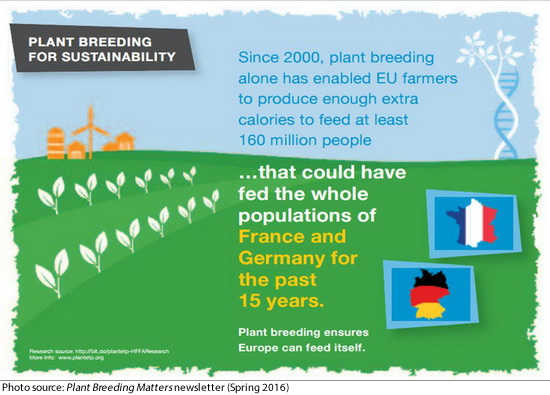
Study Highlights Impact of Plant Breeding in the EU
September 14, 2016| |
Plant breeding innovation has brought significant impacts in European agriculture, such as increase in yield with fewer inputs and less effect on the environment, according to an EU-wide study.
The report The Economic, Social, and Environmental Value of Plant Breeding in the European Union was released by Hffa Research GmbH and was commissioned by the European Technology Platform. The objective of the study was to provide science-based but easy-to-understand information on the socio-economic and environmental benefits of plant breeding in the EU. Through complex modelling and calculation tools, the findings of the study showed that "plant breeding innovations count a lot." It was reported that plant breeding contributes approximately 74 percent productivity growth on all major arable crops planted in the EU since 2000. This is equivalent to 1.24 percent yield increase per year. This also translates to a boost in the amount of available food, decrease in food prices, and economic prosperity.
Aside from yield increase, plant breeding has decreased the total use of other planting inputs such as fertilizer, pesticides, machinery, and labor by 0.5 percent for 15 years. Thus, plant breeding enables "sustainable intensification" by allowing farmers to produce more with less input and reduced effect on the environment.

Read the report from European Technology Platform. See more infographics about the report from the British Society of Plant Breeders' newsletter, Plant Breeding Matters.
| |
Biotech Updates is a weekly newsletter of ISAAA, a not-for-profit organization. It is distributed for free to over 22,000 subscribers worldwide to inform them about the key developments in biosciences, especially in biotechnology. Your support will help us in our mission to feed the world with knowledge. You can help by donating as little as $10.
-
See more articles:
-
News from Around the World
- FAO Projects Increase in Maize, Wheat, and Rice Grain Output
- Kanayo Nwanze Receives Inaugural Africa Food Prize
- Uganda's Minister of S&T Lauds Researchers on Biotech Innovations
- Kenya's National Biosafety Authority Gives GM Cotton Partial Nod
- Scientists Develop New Approach to Genetic Modification of Maize and Other Grains
- US EPA Approves New Agrisure® Trait Stack from Syngenta
- New Wheat Varieties with Dwarf Genes Show Promise
- South Asia Biotechnology Centre Invites Public Comments to Support GE Mustard
- Study Highlights Impact of Plant Breeding in the EU
-
Research Highlights
- Fern Protein Expression in Cotton Prevents Whitefly Attack
- Researchers Search for Drought-Related Transcription Factors in Common Bean
-
Beyond Crop Biotech
- Trehalase Genes Regulate Expression of the Chitin Synthesis in Red Flour Beetle
-
Resources
- Biotech Crop Annual Updates and Biotech Trait Annual Updates
-
Plant
- Geminivirus-Mediated Genome Editing in Potato Using Sequence-Specific Nucleases
- Researchers Engineer Potyvirus Resistance in Arabidopsis Using CRISPR/Cas9
-
Read the latest: - Biotech Updates (February 18, 2026)
- Gene Editing Supplement (January 28, 2026)
- Gene Drive Supplement (February 22, 2023)
-
Subscribe to BU: - Share
- Tweet
